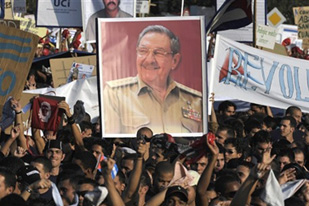
|
 |
 |
 Editorials | Issues | June 2008 Editorials | Issues | June 2008  
EU Lifts Cuba Sanctions
 Aljazeera Aljazeera
go to original


| | EU diplomats say the symbolic move is to encourage democracy and reform in Cuba (AFP) | | |
The European Union has agreed to lift its sanctions on Cuba, diplomats have said.

Benita Ferrer-Waldner, EU external relations commissioner, said the decision was made in the hope of encouraging more reforms by Raul Castro, the Cuban leader, and moves toward democracy.

The move is a largely symbolic gesture as the sanctions have been suspended since 2005.

The EU measures were imposed following a crackdown on dissent in 2003 and include a freeze on visits by high-level officials.

"There will be very clear language also on what the Cubans still have to do... releasing prisoners, really working on human rights questions," Ferrer-Waldner told reporters at an EU summit in Brussels.

"There will be a sort of review to see whether indeed something will have happened."

Spain, which restored diplomatic relations with Havana last year, had championed the move to get the sanctions lifted.

'Cosmetic' changes

The US has imposed strict economic and political sanctions on Cuba for 50 years and the EU moves is unlikely to affect Washington's position.

Tom Casey, spokesman for the US state department, said the US opposed moves in favour of Cuba, which he said remains an authoritarian regime, despite recent reforms.

Speaking to reporters Casey said that while there had been "some very minor cosmetic changes" brought in since Raul Castro too power, there was no indication of a fundamental break with communism as practiced by his predecessor, Fidel Castro.

The EU sanctions were introduced after Cuba's government rounded up 75 dissidents in 2003.

Sixteen of those arrested have been released on medical parole and another four were freed last month into forced exile in Spain.

The remaining 55 are are still serving long prison sentences. | 
 | |
 |



